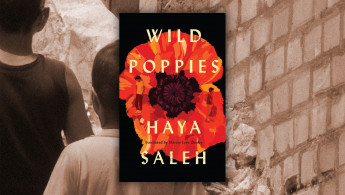Wild Poppies: An adolescent introduction to Syrian narco politics
Wild Poppies is the debut middle-grade novel by Haya Saleh (translated: Marcia Lynx Qualey), set in a fictional city, Raqqun, in Syria, amidst the years-long war.
It follows the story of two brothers, Omar and Sufyan, as they struggle to reunite after a devastating separation orchestrated by a local terrorist group, the Falcons of Truth.
Saleh’s writing style is simple, indisputably a suitable way to introduce such heavy themes to the target audience. However, the narration is somewhat disjointed, and one can sometimes feel that some context is lost in translation – not that this takes away from Saleh’s writing.
Wild Poppies is divided into five parts, alternating between Omar’s and Sufyan’s points of view, giving readers a broader sense of their siblinghood and different perspectives on the changes caused by the war.
"In Wild Poppies, like many other books that I’ve read that spotlights regions of the world where war is rampant, the characters manage to share the little affection and resources they have left with animals around them – often strays"
The story opens with the brothers, their mother and their sister, Thoraya, in a relative’s house near a refugee camp, after a heavy bombing displaced them from their village.
They have also lost their father to shrapnel wounds from the bombing as he tried to get them to safety. In the aftermath of this heavy loss, the family tries to get through their grief while surviving the harsh hunger and debilitated standards of living that comes with displacement.
With their mother’s health deteriorating and her medication running out, the shy, introverted Omar is forced to find a means of sustenance for the family – as the firstborn son. Sufyan, in his hotblooded nature, is displeased with his easy-going brother and believes that the latter is not "man enough" to fend for the family.
Eager to put the "manly" skills he learnt from his father to good use (in providing for the family), Sufyan ventures out with his friend, Rayan, to retrieve the piggy bank left behind in his bombed village.
|
It is on their way to the village that they encounter members of the Falcons of Truth; the members sell their “cause” to the young boys as a “centre that taught religion and took care of kids…giving food, drinks and even gifts to the kids who participated in their lessons”.
This particular selling clause is consequential because many of the boys that Sufyan would later meet in the Falcons of Truth claim to be there because “this was a decent place to live, with clothes, food, clean water to drink”; one boy even declares that he fights for whoever pays him the most!
For children (and even adults) living in displacement and the devastating conditions caused by the war, such reasons are good enough to join any cause – further highlighting how many Syrian kids that take up arms with terrorist groups are at first victims of the war, before anything else.
Through Omar, Saleh explores the societal expectations placed on young boys to be manly and "strong enough to protect the family", and how these expectations feed toxic masculinity and robs boys of their childhood – especially in situations of war where the deaths of parents often thrust these kids into "head of the family" status early on.
It is reflected heavily in how Sufyan repeatedly thinks of Omar as cowardly and unable to adequately fend for their family, and it is that trickle-down effect that makes the early advances of the Falcons of Truth all the more alluring.
|
After his kidnapping, Sufyan finally realises the true nature of the group. He details the oppression the group carries out in the name of God: raiding refugee camps to steal people’s basic supplies; killing anyone that disagrees with them under the guise of “carrying out God’s decree”; kidnapping young men, and forcefully marrying girls.
Sufyan also repeatedly mentions a white pill that the men of Falcons of Truth add to their drinks and eventually start handing out to the young boys; this is a brilliant way to touch on the drug use/addiction effect of the war in a middle-grade-friendly way.
Other young characters like Salma (the boys’ neighbourhood friend), Rayan (Sufyan’s friend), Rakan (a neighbourhood bully), Ayham, Hamza, and Ezzedine (Sufyan’s comrades in the Falcons of Truth) give varied perspectives to this book – they all experience the war and its effects differently, thus allowing Saleh to highlight multiple realities.
In Wild Poppies, like many other books that I’ve read that spotlights regions of the world where war is rampant, the characters manage to share the little affection and resources they have left with animals around them – often strays.
This observation is particularly evident through the character of Qattoush, Sufyan’s dog. As grumpy and impatient as he is, Sufyan never fails to care for his dog.
Long after the Falcons of Truth kidnaps him, Sufyan even notes that some boys take great care in keeping leftovers for their cats – he laments how one can kill people senselessly while judiciously feeding their cats. Human beings are, indeed, complex in their decisions!
Overall, Saleh has crafted a decent debut with Wild Poppies. It is an adequate educational tool for younger readers on the experiences of other children in a world that is rife with senseless wars.
Aisha Yusuff is a book reviewer with a focus on African and Muslim literature. Her work can be found on @thatothernigeriangirl as well as in digital magazines like Rewrite London
Follow her on Twitter: @allthingsaeesha





 Follow the Middle East's top stories in English at The New Arab on Google News
Follow the Middle East's top stories in English at The New Arab on Google News


